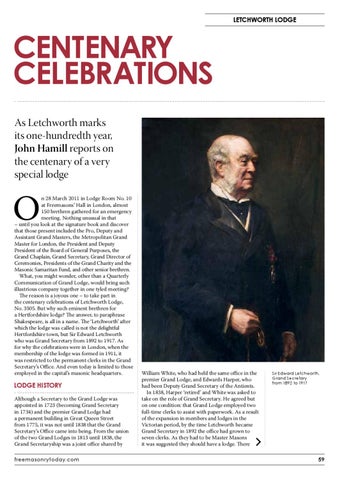leTchwOrTh lODge
cenTenArY celebrATiOns As Letchworth marks its one-hundredth year, John Hamill reports on the centenary of a very special lodge
O
n 28 March 2011 in Lodge Room No. 10 at Freemasons’ Hall in London, almost 150 brethren gathered for an emergency meeting. Nothing unusual in that – until you look at the signature book and discover that those present included the Pro, Deputy and Assistant Grand Masters, the Metropolitan Grand Master for London, the President and Deputy President of the Board of General Purposes, the Grand Chaplain, Grand Secretary, Grand Director of Ceremonies, Presidents of the Grand Charity and the Masonic Samaritan Fund, and other senior brethren. What, you might wonder, other than a Quarterly Communication of Grand Lodge, would bring such illustrious company together in one tyled meeting? The reason is a joyous one – to take part in the centenary celebrations of Letchworth Lodge, No. 3505. But why such eminent brethren for a Hertfordshire lodge? The answer, to paraphrase Shakespeare, is all in a name. The ‘Letchworth’ after which the lodge was called is not the delightful Hertfordshire town, but Sir Edward Letchworth who was Grand Secretary from 1892 to 1917. As for why the celebrations were in London, when the membership of the lodge was formed in 1911, it was restricted to the permanent clerks in the Grand Secretary’s Office. And even today is limited to those employed in the capital’s masonic headquarters.
lODge hisTOrY Although a Secretary to the Grand Lodge was appointed in 1723 (becoming Grand Secretary in 1734) and the premier Grand Lodge had a permanent building in Great Queen Street from 1775, it was not until 1838 that the Grand Secretary’s Office came into being. From the union of the two Grand Lodges in 1813 until 1838, the Grand Secretaryship was a joint office shared by
freemasonrytoday.com
William White, who had held the same office in the premier Grand Lodge, and Edwards Harper, who had been Deputy Grand Secretary of the Antients. In 1838, Harper ‘retired’ and White was asked to take on the role of Grand Secretary. He agreed but on one condition: that Grand Lodge employed two full-time clerks to assist with paperwork. As a result of the expansion in members and lodges in the Victorian period, by the time Letchworth became Grand Secretary in 1892 the office had grown to seven clerks. As they had to be Master Masons it was suggested they should have a lodge. There
Sir edward Letchworth, Grand Secretary from 1892 to 1917
59
